Discover “What’s Next?” for the Federal Market at the Fall Training Conference!
Registration is officially open for the 2024 Fall Training Conference on November 20-21 at the Fairview Park Marriott in Falls Church, VA! The theme of this year’s two-day conference will be “The 2025 Federal Market: What’s Next?” and will explore the future of the Federal procurement system after the Presidential election. Attendees will gain insights into policy shifts, the budget outlook, and the overall procurement state of play in 2025 and beyond. Acquisition officials from Federal agencies will be in attendance to provide the latest updates and discuss “what’s next” in terms of government policies, programs, and initiatives. Below is a look at some of the key governmentwide and healthcare-specific issues that this year’s agenda will explore.

November 20 – Governmentwide Focus
Kicking off the Fall Training Conference will be Former Congressman Tom Davis, who will deliver a Keynote Address titled, “What Happened, Where Are We, and Where Are We Going?” During his remarks, he will provide analysis on the election and its impacts on the Federal market. After the Keynote Address, we will shift to the day’s panels, with guest speakers from the General Services Administration (GSA), the Department of Defense (DoD), the National Aeronautics and Space Administration (NASA), and more. Some of the hot topics speakers will explore include:
- What’s next for Congress?
- What’s next for procurement policy and the Federal Acquisition Regulation (FAR)?
- What’s next for the budget and Federal market?
- What’s next for artificial intelligence (AI), cybersecurity, and cloud?
- What’s next for GSA’s Multiple Award Schedule (MAS) Program?
- What’s next for interagency contracting?
- What’s next for GSA’s IT and Professional Services Categories, including the Schedules and GWACs?
- What’s next for GSA’s General Supplies and Services, including e-commerce platforms?
- What’s next for agency acquisition systems?
- What’s next for GSA’s Assisted Acquisition Services?
November 21 – Healthcare Focus
Discussions on November 21 will explore healthcare-specific topics, with a focus on what’s ahead for procurement in this crucial sector. Invited speakers will be from the Department of Veterans Affairs (VA), the Department of Human and Health Services (HHS), the Defense Health Agency (DHA), and more. Attendees will gain critical insights into:
- What’s next for the VA budget and healthcare investments?
- What’s next for the Veterans Health Administration?
- What’s next for healthcare customer agencies such as HHS, DHA, and more?
- What’s next for the VA’s Medical/Surgical Prime Vendor (MSPV) Program?
- What’s next for DLA programs, including MSPV and ECAT?
- What’s next for healthcare agency pharmaceutical programs?
- What’s next for the VA’s Prosthetics program?
Delve into these questions and more at this year’s Fall Training Conference! The conference presents a valuable opportunity for professionals in the Federal procurement community to stay ahead of the curve with the latest trends and developments while preparing for upcoming policy changes. Don’t miss out – register today to secure your spot!
Stay tuned for the release of the full draft agenda next week!
To register for the Fall Training Conference, click here. Book your group rate at the Fairview Park Marriott for the Fall Conference here.
November 19 – Small Business Policy Year in Review for FY 2024
In addition, the Coalition will once again host a Small Business Policy Year in Review for Fiscal Year 2024 on November 19. This event recaps important small business policy developments of 2024 and equips members with key considerations moving forward. Both small and large businesses are encouraged to attend to learn about best practices in teaming and what makes for a successful, sound business relationship. More details on the Small Business Policy Year in Review will be released soon.
We look forward to seeing you in November for what’s next!
Thank You for Attending the Cyberside Chat!
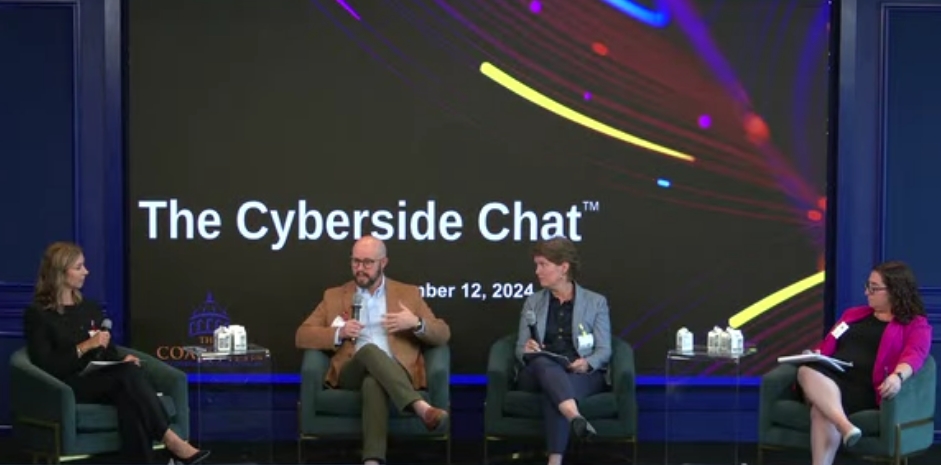
Thank you to everyone who joined us on September 12 for the Coalition’s inaugural Cybersecurity Symposium: The Cyberside Chat™! Your participation and engagement made this event a tremendous success, as we explored critical cybersecurity challenges impacting the Federal market. We would like to give a special thanks to Google Cloud for hosting and all our expert panelists and moderators for sharing their insights:
Cyberside Chat Panel
- Robert Metzger, Shareholder, Rogers Joseph O’Donnell
- Jeff Spinnanger, Director, Information and Acquisition Protection, Office of the Under Secretary of Defense for Intelligence & Security, DoD
- Stacy Bostjanick, Chief Defense Industrial Base Cybersecurity, Office of the DoD Chief Information Officer and CMMC Director, DoD
- Devin Casey, Chief, CUI/CNSI, Office of the Under Secretary of Defense for Intelligence & Security
The Dynamics of Cybersecurity Procurement Management
- Omid Ghaffari-Tabrizi, Head of Federal Civilian Policy, Google
- Kevin Funk, Cybersecurity & Technology Senior Advisor, GSA
- Darrick Early, Client Executive, AAS Civilian, GSA
The Black, White, and Grey of Cybersecurity Compliance
- Townsend Bourne, Partner at Sheppard Mullin
- Sara McLean, Assistant Director, Commercial Litigation Branch, DoJ
- Michael Gruden, Counsel, Crowell & Moring
- Leah Schloss, Senior Counsel, CISA
Join Our Sponsor Lineup for the 2024 Fall Training Conference!
The Coalition for Government Procurement is pleased to announce that multiple sponsorship packages are available for the 2024 Fall Training Conference – 2025 Market Outlook: What’s Next? As always, the Fall Training Conference will serve as a unique opportunity to engage with Federal procurement leaders and connect with industry colleagues.
You will see in the Sponsorship Prospectus that a variety of Premier and Auxiliary packages are available to choose from, each offering many great benefits to further boost your company’s exposure! Secure your sponsorship today and showcase your organization’s brand to the Federal acquisition community.
Click here to download the Sponsorship Prospectus.
Elevate Your Company’s Brand with Prime Mobile App Exposure
We are excited to offer an exclusive sponsorship opportunity that puts your company front and center at our upcoming Fall Training Conference. By sponsoring our mobile event app, your company will gain prime exposure to all conference attendees throughout the entire two-day event.
Key Benefits of the Mobile App Sponsorship:
- Prime Home Page Placement: Your company’s name and logo will be prominently displayed on the home page of the conference app, ensuring maximum visibility every time an attendee opens the app.
- Constant Brand Visibility: The app will be the go-to resource for attendees, featuring peer-to-peer messaging and offering essential information like the conference schedule, session topics, speaker bios, and more. Your brand will be seen repeatedly, reinforcing your company’s presence and commitment to the industry.
*Pricing details included in the prospectus. For more information, please contact Heather Tarpley at htarpley@thecgp.org.
Thank you to our current sponsors of the Fall Training Conference!
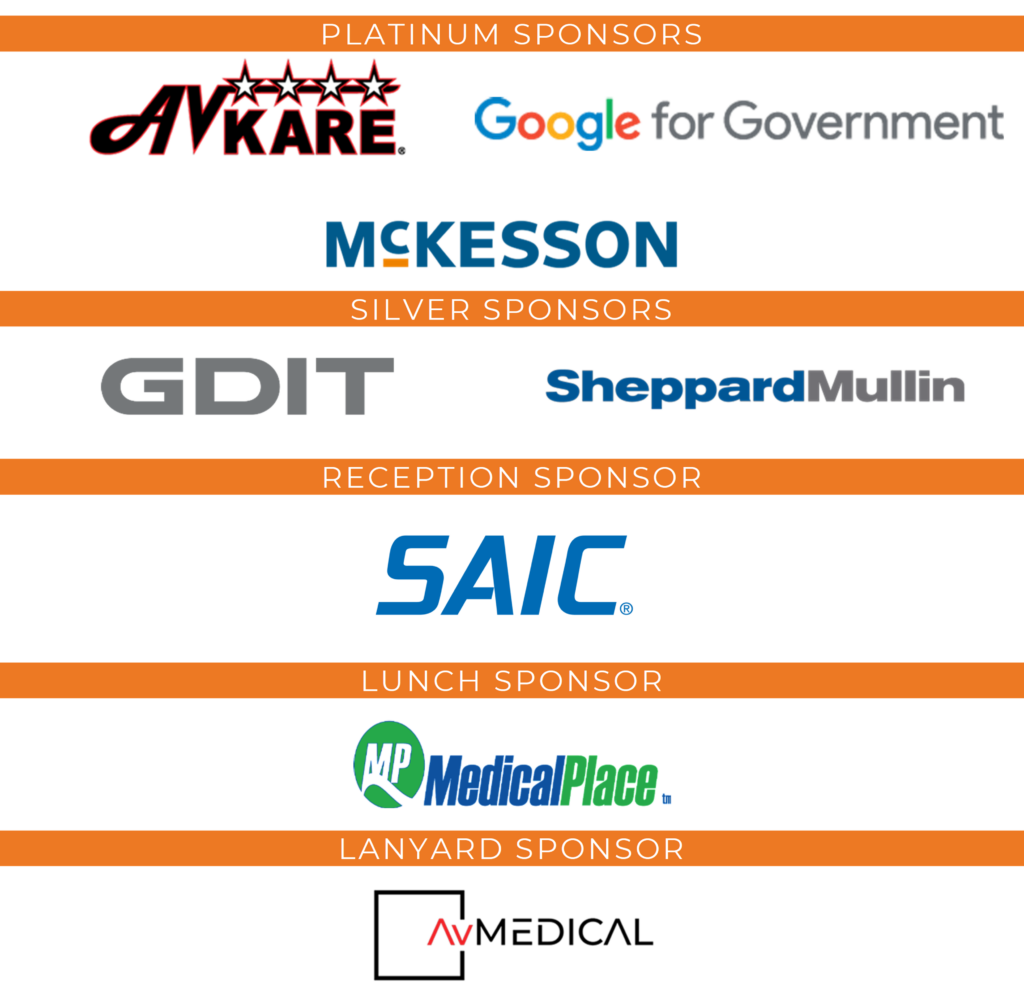
We look forward to partnering with you to make the Fall Training Conference a resounding
House Preparing CR for FY25
According to Inside Defense, this week Speaker Mike Johnson (R-LA) withdrew a stopgap continuing resolution (CR) proposal that included citizenship voting requirements and would have funded the Federal government through March 2025. The Speaker cancelled the vote to “build consensus over the weekend” due to objections to the CR because of its impact on the Department of Defense. The 6-month CR would have frozen the Department’s budget at the fiscal year 2024 level and prohibited new spending on modernization programs. Defense Secretary Lloyd Austin sent a letter to Congress detailing ways in which the CR would “harm military readiness and weapons modernization.”
The House and Senate will return next week and continue its work to pass a CR by the end of September. Thus far, the Senate prefers a “clean” CR. We will update members on any developments in next week’s Friday Flash.
EPA Updating Recommended Ecolabels for Healthcare and Furniture
On September 9, the Environmental Protection Agency (EPA) released a pre-publication proposed update to its “Recommendation of Specifications, Standards and Ecolabels for Federal Purchasing.” This ecolabel program leverages over 40 private sector standards/ecolabels to identify and recommend sustainable products to Federal purchasers. The standards cover more than 30 purchase categories. The EPA is considering adding standards/ecolabels in the following product categories:
- Healthcare
- Laboratories
- Clothing and Uniforms
- Cafeteria and Food Service
The EPA is also considering removing select standards/ecolabels from the following product categories:
- Furniture
- Carpet, Flooring, Furniture, Interior Latex Paint
- Copy Paper
- De-icer
- Carpet, Flooring, Furniture, Interior Latex Paint, Other Miscellaneous Building Finishes
- Network Equipment and Cloud Services
The EPA will publish the proposed update in the Federal Register. Once it is published, there will be 30 days for public comments. The Coalition will notify members in the Flash as soon as its published. For more information, please contact Greg Waldron at gwaldron@thecgp.org or (202) 521-3533 ext. 132.
House Passes BIOSECURE Act
On September 9, the House passed the BIOSECURE Act by a vote of 306 to 81. The bill now must pass the Senate and be signed by the president to become law. The BIOSECURE Act (HR 8333) prohibits Federal agencies from procuring or using any biotechnology equipment or services from a “biotechnology company of concern,” as well as contracting with entities that do so. A biotechnology company of concern is defined as “an entity that is under the control of a foreign adversary and that poses a risk to national security based on its research or multiomic data collection (e.g., collection of genomic information).” The Office of Management and Budget is tasked with developing a list of prohibited companies. The list currently consists of Chinese biotechnology companies such as BGI, MGI, Complete Genomics, and others.
Progress on AI Benchmarks
According to a recent Government Accountability Office (GAO) report, six Federal agencies have fully met the initial AI benchmarks set by the AI executive order published in October 2023. GAO’s report covered 13 specific requirements aimed at improving AI management, increasing AI expertise, and coordinating AI policies. The table below outlines the agencies and their efforts:

GAO noted that these steps are likely to boost AI expertise rapidly and efficiently in critical areas. This report follows the White House’s January announcement that all initial 90-day requirements of the executive order were met.
Agencies Advancing Zero Trust Implementation
Fedscoop reports that the White House is nearing full implementation of Zero Trust architecture across Federal agencies by the September 30 deadline. At a recent cybersecurity summit, Federal Chief Information Officer Claire Martorana reported that the 24 Chief Financial Officers Act agencies are in the “high 90 percent range” for adopting Zero Trust basics, with overall completion rates improving from 81 to 87 percent. Martorana emphasized that Zero Trust is an ongoing process requiring consistent funding and highlighted the Technology Modernization Fund’s (TMF) role in supporting agencies’ cybersecurity initiatives. She noted that 83 percent of TMF investments have funded cybersecurity-related efforts. Several agencies, including GSA, are using TMF investments to advance their Zero Trust initiatives.
GSA Update on Ascend Cloud BPA
Last week, GSA published a Request for Information (RFI) for Pool 2 (Software as a Service) and Pool 3 (Cloud-related IT Professional Services) of its Ascend BPA for governmentwide cloud services. The RFI is for continued market research and includes additional questions about industry’s ability to respond to requirements. Responses are due on September 20.
In addition, GSA Assistant Commissioner for the Office of Information Technology Category, Laura Stanton, published a blog with an update on Pool 1 of the Ascend BPA, stating that GSA “is closer to releasing a final solicitation.” Based on industry feedback, GSA will require order catalogs at the BPA level instead of the order level, enable upon request instead of requiring contractors to provide cybersecurity logs, provide more control over cloud service usage to users, and reduce the cybersecurity incident reporting requirements. GSA plans to host an industry day on the revised Pool 1 draft solicitation on October 3. Learn more about the industry day here.
GSA Addressing OASIS+ Protests
According to Washington Technology, several bid protests of GSA’s OASIS+ Small Business contract were dismissed. GSA plans to take corrective action for four protests and will reevaluate the companies’ proposals. A fifth protest is also expected to be dismissed soon. Six protests still remain open, with final rulings from GAO due between November 15 and December 2.
GSA announced 1,383 OASIS+ Small Business awardees on July 30. On August 15, GSA delayed the awards as a result of the 11 protests in response to the awardee announcement. GSA plans to share updates on the status of the awards as soon as possible. OASIS+ Small Business is one of six contracts in the OASIS+ program.
TMF Director Highlights Future of the Program
During an interview with Fedscoop, the Executive Director of the Technology Management Fund (TMF) shared his vision for the future of the program. Larry Bafundo, who was appointed as Executive Director in June, highlighted the strong demand for TMF funding throughout the program’s lifetime, with almost $4 billion in proposals received to date. Currently, TMF manages over $1 billion in investments across 34 agencies. He stated that the future of the program “will feature a strong emphasis on projects that have a clear potential for governmentwide impact.” Specifically, investments will prioritize AI, data management and analytics, shared services, cloud migration, and more.
Potential changes to the TMF program that could assist with agency modernization efforts include more flexible repayment terms as well as the adoption of modern management practices and alternative procurement methods. Consistent appropriations are critical to the program. There have been several calls from the Federal Chief Information Officer to fund the TMF, as well as efforts from Congress to pass a bill that would require TMF funds to be reimbursed or repaid.
Seeking Member Input on DFARS Rule Implementing CMMC
On August 15, the Department of Defense (DoD) published a proposed rule titled, “Assessing Contractor Implementation of Cybersecurity Requirements,” to amend the Defense Acquisition Regulations Supplement (DFARS) to incorporate contractual requirements for the Cybersecurity Maturation Model Certification (CMMC) 2.0 program.
The CMMC 2.0 Program requirements apply to all DoD solicitations and contracts pursuant to which a defense contractor or subcontractor will process, store, or transmit Federal Contract Information (FCI) or Controlled Unclassified Information (CUI) on information systems, including those for the acquisition of commercial items (except those for commercially available off-the-shelf (COTS) items) valued at greater than the micropurchase threshold (MPT).
According to the proposed rule, DoD plans to implement a phased rollout of CMMC. DFARS clause 252.204-7021, Contractor Compliance with the CMMC Requirements, will be used in solicitations and contracts that require contractors to have a specific CMMC level, including those using FAR Part 12 for commercial products and commercial services, with the exception of COTS items. In the first three years following publication of the final rule, DoD program offices and requiring activities will determine whether to use clause DFARS 252.204-7021 in contracts and solicitations. In the fourth year following the 3 year “phase-in” period, CMMC will apply to all applicable DoD solicitations and contracts, including those for the acquisition of commercial products and commercial services (except for COTS items), valued at greater than the MPT. The required CMMC level will be identified by DoD in the solicitation or contract. According to the proposed rule, CMMC level certification must be achieved prior to contract award and maintained throughout the duration of the contract. In addition, CMMC requirements must be flowed down to subcontractors at all tiers, “when the subcontractor will process, store, or transmit Federal contract information or CUI.”
Comments on the proposed rule are due on or before October 15, 2024.
The Coalition plans to submit comments. Please submit any feedback on the proposed rule by September 27 to Greg Waldron at gwaldron@thecgp.org.
Legal Corner: The Pentagon’s CMMC Program Takes a Big Step Forward
The Legal Corner provides the procurement community with an opportunity to share insights and comments on relevant legal issues of the day. The comments herein do not necessarily reflect the views of The Coalition for Government Procurement.
Authored by Eric S. Crusius, Holland & Knight
The U.S. Department of Defense (DOD) issued the proposed Defense Federal Acquisition Regulation Supplement (DFARS) rules that will implement the Cybersecurity Maturity Model Certification (CMMC) program. These rules, which will be placed into all DOD contracts, will require all contractors to self-certify or obtain a third-party certification prior to beginning work on any DOD contracts. The kind of certification necessary will be dependent on the level of security necessary for the information generated or stored under the contract. Comments on the proposed rule are due on Oct. 15, 2024.
There are two sets of rules that will be utilized when the CMMC program is fully formed. The first, issued under Title 32 of the Code of Federal Regulations (CFR), establishes the CMMC program. These were initially proposed on Dec. 26, 2023, and the U.S. Office of Management and Budget (OMB) is reviewing the final regulations, with release expected before the end of the year. The second set of rules, which are the subject of this blog, are issued under Title 48 and will be placed in DOD contracts and refer back to the Title 32 rules.
If adopted as proposed, these rules will require contractors to have a current CMMC assessment at the time of award and maintain that assessment for the duration of the contract. Contractors without a required assessment will not be awarded a contract, and contractors who fail to maintain an assessment during the contract period will be subject to termination.
Further, to better track compliance, each contractor-assessed system will be tagged with a DOD unique identifier (UID), and if any of the systems supporting the performance of the contract change, the contractor is responsible for updating the UID with the contracting officer. The proposed rules offer important insights into the CMMC program:
Subcontractor Compliance. DOD notes that prime and higher-tiered contractors will not have access to DOD databases to verify that companies have the certification level claimed. It is DOD’s position that that is an issue for the parties to work out themselves. Prime contractors or higher-tiered subcontractors should address this issue in subcontract agreements.
Additional Incident Notifications. In the proposed regulation, DOD states that contractors are required to “[n]otify the Contracting Officer within 72 hours when there are any lapses in information security …” It is unclear what a “lapse” in information security is versus incident notifications required under DFARS 252.204-7012. This, of course, adds an additional notification requirement for contractors with Controlled Unclassified Information (CUI) and adds a new one for contractors that have Federal Contract Information (FCI) (which maps to a CMMC Level 1 self-assessment).
Assessment Change Notifications. Contractors will also have to notify the contracting officer within 72 hours if there is a change in CMMC certificate status or assessment level.
International Companies and Systems. DOD makes clear that companies or systems outside the U.S. will be held to the same standards as their U.S.-based counterparts. There are additional challenges, including host nation restrictions on foreign review of information systems and finding a certified third-party assessment organization (C3PAO) capable of conducting a review outside the U.S.
Implementation Timing. DOD notes a phased-in approach, but it is unknown at what point DOD will determine which programs will be part of the initial rollout (or if there will be a coordinated rollout across specific contracts). Because of that, contractors should prepare for the possibility that new DOD contracts will require a CMMC assessment in the first half of 2025.
False Claims. These regulations continue to raise the specter of False Claims Act liability. Information systems will be tied to information-specific contracts, and affirmations will be required annually. Those affirmations will have to attest that no material changes have occurred to the information system. So if a contractor upgrades a system (outside the regular patching process) or merges with another entity, a new assessment will be required in order for the contractor to continue performing, and an affirmation that ignores these changes could open a company up to liability.
Level Determination. Besides the CMMC clause, there is a separate clause where DOD will notify offerors which CMMC level will be required prior to award for each information system that will store/process data as part of performance under the contract. The level determination could raise some pre-award protests tied to DOD’s categorization of the information as CUI versus FCI.
Further, confirming the broad applicability of CMMC, DOD confirmed that these requirements will be applicable to contracts below the Simplified Acquisition Threshold (which currently sits at $250,000). The only exceptions are for contracts solely for the purchase of Commercial Off-the-Shelf items or contracts under the $10,000 micro-purchase threshold.
These proposed rules represent continued affirmation to DOD’s dedication to rolling out CMMC soon. Contractors in the DOD space should not delay in preparing for the rolling out of CMMC in 2025.
Healthcare Spotlight: VA Supplemental Funding Bill Introduced to Address Budget Shortfall
Federal News Network reports that the Veterans Benefits Continuity and Accountability Supplemental Appropriations Act was introduced on September 6 to address a budget shortfall at the Department of Veterans Affairs (VA). The bill would provide the VA with $2.89 billion through the end of FY24 so that the department has enough funding to pay veterans’ compensation, pension, and readjustment benefits. The supplemental funding, however, does not cover an additional $12 billion shortfall anticipated for FY25.
Increased hiring within the department, an increase in veteran enrollment through the PACT Act, the Community Care program and pharmaceutical costs have been cited as major contributors to the shortfall. Over 700,000 veterans have enrolled in VA healthcare since the signing of the PACT Act in 2022, about a 33 percent increase over the previous two-year period before its enactment. The VA hired more than 61,000 employees in FY23 in response to the record levels of care and benefits being provided, raising the Veterans Health Administration’s total number of employees to over 400,000.
The VA is requesting $12 billion in additional funding to address the projected budget shortfall for FY 25. Under Secretary for Health Shereef Elnahal stated that the supplemental funding would “allow VHA to increase its headcount by 5,000 employees.” A third of the funds would address rising costs of prescription drugs and prosthetics. The plan to increase its workforce diverges from the VA’s FY25 budget request, where the department proposed reducing its workforce by 10,000 positions, mostly within VHA.
Accounting Corner: A First Look at the Highly Anticipated Alliant 3 RFP
The Accounting Corner provides the procurement community with an opportunity to share insights and comments on relevant issues of the day. The comments herein do not necessarily reflect the views of The Coalition for Government Procurement.
Authored by Leo Alvarez, Dylan Schreiner, Molly Menoni, and Alyssa Goerke; Baker Tilly
Updated on August 23, 2024: The General Services Administration (GSA) has released the final version of the Alliant 3 solicitation. After two previous drafts had been released and open for questions, the final request for proposal (RFP) was published on June 28, 2024. All proposals must be submitted on Jan. 10, 2025, giving contractors ample time to prepare all supporting documents and proposals for submission.
There were several updates made since the second draft of the RFP was published in December 2023. Below are some of the major changes and key considerations potential offerors should be aware of when preparing their response to the RFP.
*Note: Potential offerors should also review Baker Tilly’s article covering updates from draft RFP 1 to draft RFP 2.
Major changes and key considerations
Contemplated number of awards
In a welcome update, GSA increased the number of awards they intend to make from 60 awards to 76 awards. Language surrounding tied scores has remained the same—in the event of one or more tied scores at the 76th position, each offeror will receive an award. Should a tied score occur above the 76th position, the two offerors will also receive awards.
Scorecard changes
There were some minor changes to the scorecard for the final RFP that resulted in a reduction of the maximum possible points from a previous total of 92,200 to a final total of 89,950 points across the seven (7) volumes. The scoring updates are below:
View from Main Street: SBA’s Proposed Rule
Updates on Timely Topics Impacting the Government Contracting Industry from the Coalition’s Vice President of Acquisition Policy, Ken Dodds
On August 23, 2024, SBA issued a proposed rule addressing multiple small business contracting programs, including HUBZone, 8(a), size, recertification, and mentor protégé joint ventures. 89 FR 68274. Comments are due no later than October 7, 2024. Implementation of some of these proposed policy changes in a final rule will hinge on the election in November.
HUBZone
SBA is proposing to scale back some of the compliance reforms it enacted in 2019. HUBZone employees must work 80 hours a month (instead of 40) and perform legitimate work for the concern. For firms where all employees work remotely, at least 51% of its employees must reside/work in a HUBZone. Firms may count only one employee as a legacy HUBZone employee (an employee that used to live in a HUBZone but no longer does). HUBZone firms must be eligible at time of offer for a HUBZone contract (like other SBA programs) and must recertify HUBZone program eligibility every three years.
8(a)
Unlike other SBA certification programs, SBA’s 8(a) program has a good character requirement because it is a developmental program. SBA is proposing that applicants will not be automatically barred from certification based on possible past criminal activity, and a denial of certification based on a lack of business integrity will be based on conduct that could be grounds for suspension and debarment. Some other clarifications include a non-disadvantaged minority owner’s right of first refusal does not negatively impact a disadvantaged individual’s ability to control the concern; SBA can accept a follow-on sole source contract offered to an incumbent 8(a) concern without considering the equitable geographic distribution of contracts; and non-disadvantaged individuals or concerns in the same line of business can own up to 20 percent of a concern in the development stage of the program and 30 percent of a concern in the transitional stage.
Mentor Protégé Joint Ventures
Essentially agreeing with the Court of Federal Claims decision in Synergy, SBA is proposing that a procuring agency can require a protégé to demonstrate some past performance but not at the same contract dollar value required of other offerors. Addressing situations where a mentor acquires another mentor, SBA is proposing procedures to ensure that the acquiring mentor does not have competing joint ventures on the same multiple award contract.
Limitations on Subcontracting
SBA is proposing to clarify that the ordering agency contracting officer should monitor compliance with the limitations on subcontracting for orders set aside under multi-agency contracts, and leased employees count toward performance requirements (unlike independent contractors).
Recertification
In response to GAO and OHA decisions which allowed firms that had recertified as other than small for a contract to compete for set-aside orders, SBA is proposing to clarify that a firm that recertifies as other than small or no longer qualifying for a socioeconomic designation for a contract as a result of a merger or acquisition, or prior to an option period, is not eligible for set-aside orders, including under the Federal Supply Schedule. In addition, SBA is proposing that a firm that is not small or that does not meet socioeconomic status requirements at the time of recertification for an option period on a long-term multiple award set-aside contract is not eligible to receive the option.
Negative Control
For certification programs based on ownership and control by designated individuals (8(a), SDVO, WOSB), SBA is proposing to clarify that minority owner consent can be required for extraordinary circumstances: adding a new equity stakeholder, dissolution of the company, sale of the company or its assets, merger, bankruptcy, or amending governing documents to remove minority consent for the actions listed above.
Annual Receipts
SBA is proposing that it may look beyond tax forms in calculating size when it does not believe tax forms adequately capture revenue. While SBA must be able to look beyond tax returns that it believes are false, a firm’s financial statements may not necessarily reflect revenue the same way that revenue is reported for tax purposes. If a firm may legally exclude certain revenue for tax purposes, it should not be found to be other than small based on financial statements or other financial reports created for different purposes utilizing different rules. Also, due to a District Court False Claims Act decision, there has been some confusion around the exclusions from revenue in SBA’s regulations. SBA’s rules need to clarify that the exclusions in SBA’s regulations apply after the firm has reported its revenue for tax purposes, utilizing whatever exclusions are legally available for tax purposes. SBA’s exclusion from revenue rule is for size determination purposes and is not intended to limit what a firm can exclude from its revenue for tax purposes.
Nominations Now Open for the 2024 Excellence in Partnership Awards!
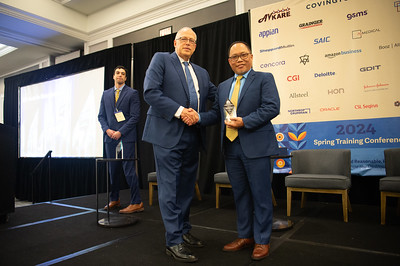
The Coalition for Government Procurement is excited to announce that nominations are now open for the 2024 Excellence in Partnership (EIP) Awards!
The EIP Awards recognize individuals and organizations in the Federal procurement community who make significant contributions to the acquisition system. The awards recognize individuals and programs from the Department of Defense, civilian agencies, and industry. Throughout the years, the EIP Awards have highlighted a number of outstanding efforts, programs, and initiatives led by procurement professionals who are dedicated to meeting the mission critical needs of agencies and the American people.
2024 EIP Awards categories:
Lifetime Acquisition Excellence Award – Presented to an individual in the contracting community (government or industry) for demonstrating a life-long commitment to advancing “common sense in government procurement.”
Acquisition Excellence Award – Presented to an organization or individual (government or contractor) for outstanding performance over the year in meeting the mission-critical needs of a Federal agency.
Sustainable Excellence Award – Presented to a government agency or contractor that has made outstanding contributions that meet the Federal Government’s sustainability goals.
Advocating for Veterans Award – Presented to an organization or individual (government or contractor) for promoting and executing a successful program or policy that supports veterans.
We strongly encourage you to nominate a deserving colleague or collaborator who has demonstrated their commitment and expertise in the Federal procurement space. The nomination deadline is October 4, 2024.
To submit a nomination, click here.
If you have any questions regarding the EIP Awards or nomination process, please contact our EIP Award team at nominations@thecgp.org.
Part II Briefing on Accredo Specialty Pharmacy, September 17
The Coalition’s Pharmaceutical Committee will host a virtual Part II Briefing on the Accredo Transition on September 17, at 11:00 AM (ET).
As of March 1, all prescriptions for replenishable specialty products are being handled by Accredo. We will be joined by three guest speakers who are experts on the program. They will share the latest program updates and answer any questions you may have.
Guest Speakers:
- Viktoria Reed, Contracting Officer, Defense Health Agency
- Aaron Middlekauf, VP, Government Accounts, DoD Cencora
- Lisa Adams, Senior Director – Military & Veterans Account Management, Express Scripts
Our guest speakers are very interested in what topics and questions you would like them to cover. Please send any questions or topics of interest about Accredo to Gregory Waldron at gwaldron@thecgp.org.
To register, click here. For any assistance with registration, please contact Madyson Whiting at mwhiting@thecgp.org.
New Webinar: Bid Protests and Other Recent Federal Contract-Related Litigation – and Impacts on Contractors, October 3

The Coalition is pleased to host a webinar, Bid Protests and Other Recent Federal Contract-Related Litigation – and Impacts on Contractors, on October 3 from 12:00 – 1:00 PM (ET). Guest presenters include Mayer Brown attorneys Luke Levasseur and Evan Williams. During the webinar, Luke and Evan will cover a number of key topics, including:
- Essential information about the bid protest process that every contractor should know;
- Strategic considerations related to pursuing and intervening in bid protests;
- Recent, noteworthy bid protest decisions;
- Important other federal contract litigation; and
- Impact of Loper Bright and the end of Chevron deference on government contractors.
To register, click here. For any assistance with registration, please contact Madyson Whiting at mwhiting@thecgp.org.
Imaging Equipment Committee Meeting with MAS Office Management Branch, October 9
On October 9, the Coalition’s Imaging Equipment committee will host a virtual meeting with Michael Burrell, Senior Section Chief of the MAS Office Management Branch at GSA. Michael will provide an update on the Office Management segment, software attestation requirements included in the upcoming MAS modification, and the new economic price adjustment clause.
GSA has requested that members provide questions and topics that they would like discussed at the meeting. Please submit your questions and topics to Joseph Snyderwine at JSnyderwine@thecgp.org.
To register, click here. For any assistance with registration, please contact Madyson Whiting at mwhiting@thecgp.org.
IT/Services Committee Meeting with GSA ITC Assistant Commissioner, October 23
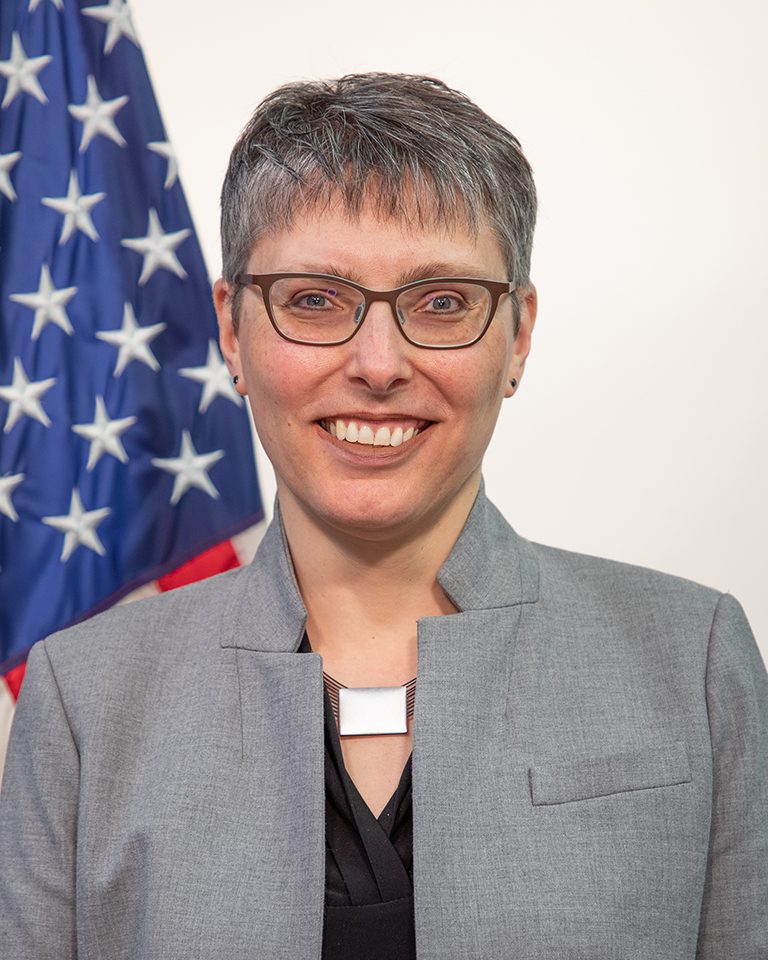
On October 23, the Coalition’s IT/Services Committee will host a meeting with Laura Stanton, GSA Assistant Commissioner for the Office of Information Technology Category (ITC). During the meeting, she will provide an update on the ITC’s latest priorities and initiatives.
To provide topics and questions for the meeting, please contact Joseph Snyderwine at JSnyderwine@thecgp.org. The meeting will be held in the DMV area. Virtual attendance will also be available.
To register, click here. For any assistance with registration, please contact Madyson Whiting at mwhiting@thecgp.org.
Annual Meeting with VA National Acquisition Center (NAC), October 24
The Coalition for Government Procurement is pleased to announce that its Annual Meeting with the VA National Acquisition Center (NAC) will be Thursday, October 24 in Northern Virginia. (We are currently identifying a meeting location and will notify members as soon as one is confirmed.)
The Annual VA NAC meeting is one of the most popular events for our Healthcare members. This year’s event will feature VA leadership from the VA Federal Supply Schedules (FSS) program as well as the National Contract Service (NCS). For the first time, we will also hear from acquisition leaders with the Commodity & Services Acquisition Center (CSAS) and the Denver Logistics Center (DLC)! The VA OSDBU has also been invited to participate with a tabletop.
VA speakers include:
- Christopher Parker, Associate Executive Director, Strategic Acquisition Center & Acting Associate Executive Director, National Acquisition Center
- Dan Shearer, VA Federal Supply Schedule (FSS) Director
- Fran DeRosa, VA National Contract Service (NCS) Director
- Andrea Lay, Director, Commodity & Services Acquisition Service (CSAS)
- Kevin Quitmeyer, Director, Denver Logistics Center (DLC)
Annual VA NAC Meeting Agenda:
- 7:30 am – 9:00 am: Registration
- 9:00 am – 9:15 am: Introduction Remarks from the VA
- 9:15 am – 10:15 am: VA NAC Directors Panel
- 10:15 am – 11:00 am: Networking
- 11:00 am – 12:00 pm: VA NAC Federal Supply Schedule Panel
- 12:00 pm – 12:30 pm: Final Q&A
For the detailed agenda with all speakers, click here. The program will cover the latest developments for VA FSS, CSAS, DLC, and NCS contracts and public law topics for pharmaceutical members. There will also be time to network with leadership of these contracting programs.
This members-only meeting will be in-person and complimentary. To register, click here. For questions or assistance with registration, please contact Madyson Whiting at MWhiting@thecgp.org.
Don’t Miss the 2024 FPS Government Contracts Year in Review!
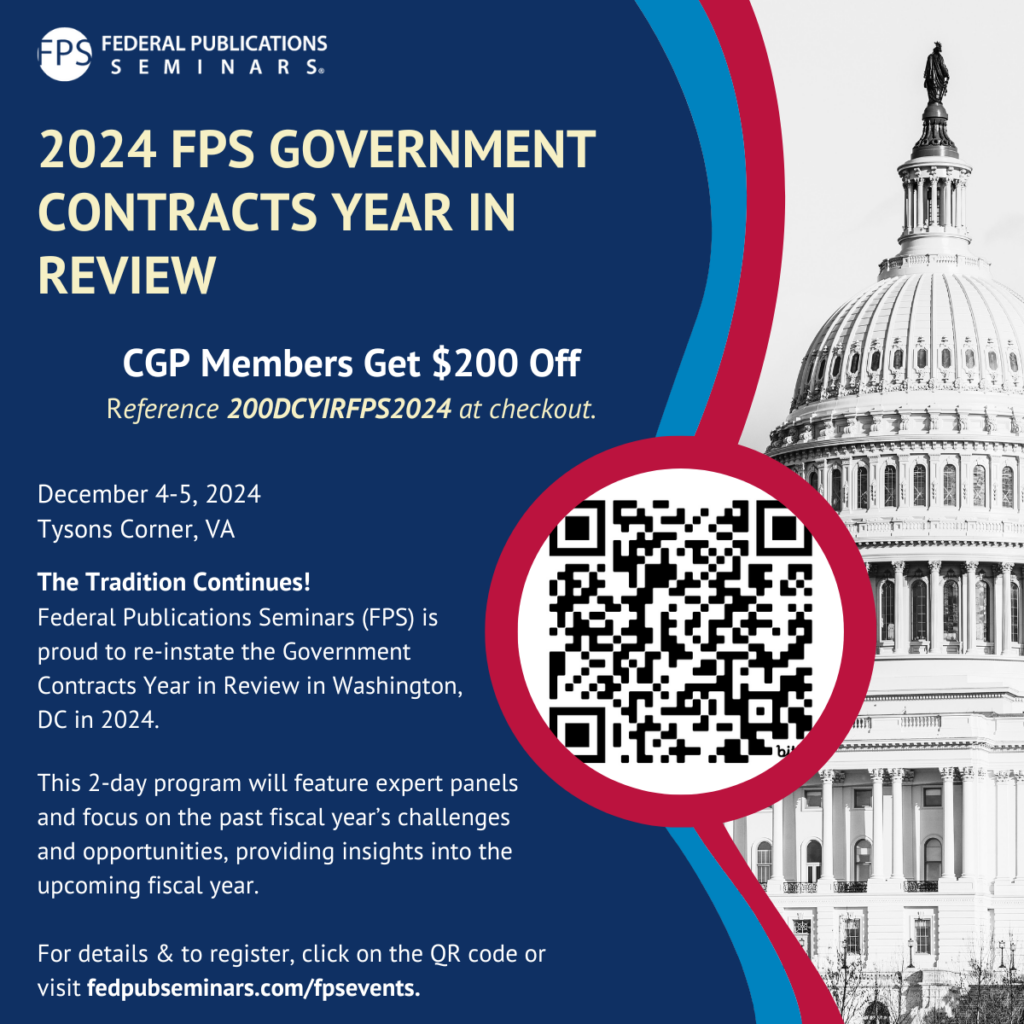
For over four decades, this industry-leading conference has been the essential gathering for government contracting professionals. Join Federal Publications Seminars (FPS) on December 4-5 at The Westin in Tyson’s Corner, Washington, DC, to delve into the most critical legal and compliance issues impacting Federal contracting in 2024. Network with peers, gain insights from top experts, and stay ahead of industry trends. As a Coalition member, enjoy a $200 discount with promo code 200DCYIRFPS2024.
To register, click here.
“Coalition Consults” on VA Contracting Programs
The Coalition is proud to offer our latest new resource for our healthcare members, called Coalition Consults. The first set of consults address key contracting programs at the US Department of Veterans Affairs (VA) for medical/surgical supply and medical device companies. They provide basic information about the product scope of each contract and how companies can pursue these contracts including the appropriate VA contacts. Coalition Consults are currently available for the following VA contracts:
- New! VA Durable Medical Equipment (DME) program
- VA Med-Surg Prime Vendor (MSPV) program
- VA & DoD High Tech Medical Equipment (HTME) program
- VA Medical Device Implant program
- VA Non-Expendable (NX) Program
To access the Coalition Consults, click here. For any questions, please contact Aubrey Woolley at awoolley@thecgp.org.
VA Data for Healthcare Members
To increase the number of valuable tools available for members, the Coalition has compiled several data sets pertaining to VA Medical Centers’ procedures, diagnoses, and product spend. Below is a description of the different VA data reports that the Coalition can provide to healthcare members based on areas of interest to their business:
- Diagnosis data by each VA Medical Center: Members can request a report by providing the relevant International Classification of Diseases (ICD)-10 codes of interest to their business.
- Procedure data by each VA Medical Center: Members can request a report by providing the relevant Current Procedural Terminology (CPT) codes of interest to their business.
- Prosthetic (medical implants, DME) product spend by VA Medical Center: members can request a report by providing the relevant Healthcare Common Procedure Coding System (HCPCS) codes of interest to their business for items managed by VHA Prosthetics.
For any data requests or related questions, please contact Michael Hanafin at mhanafin@thecgp.org.